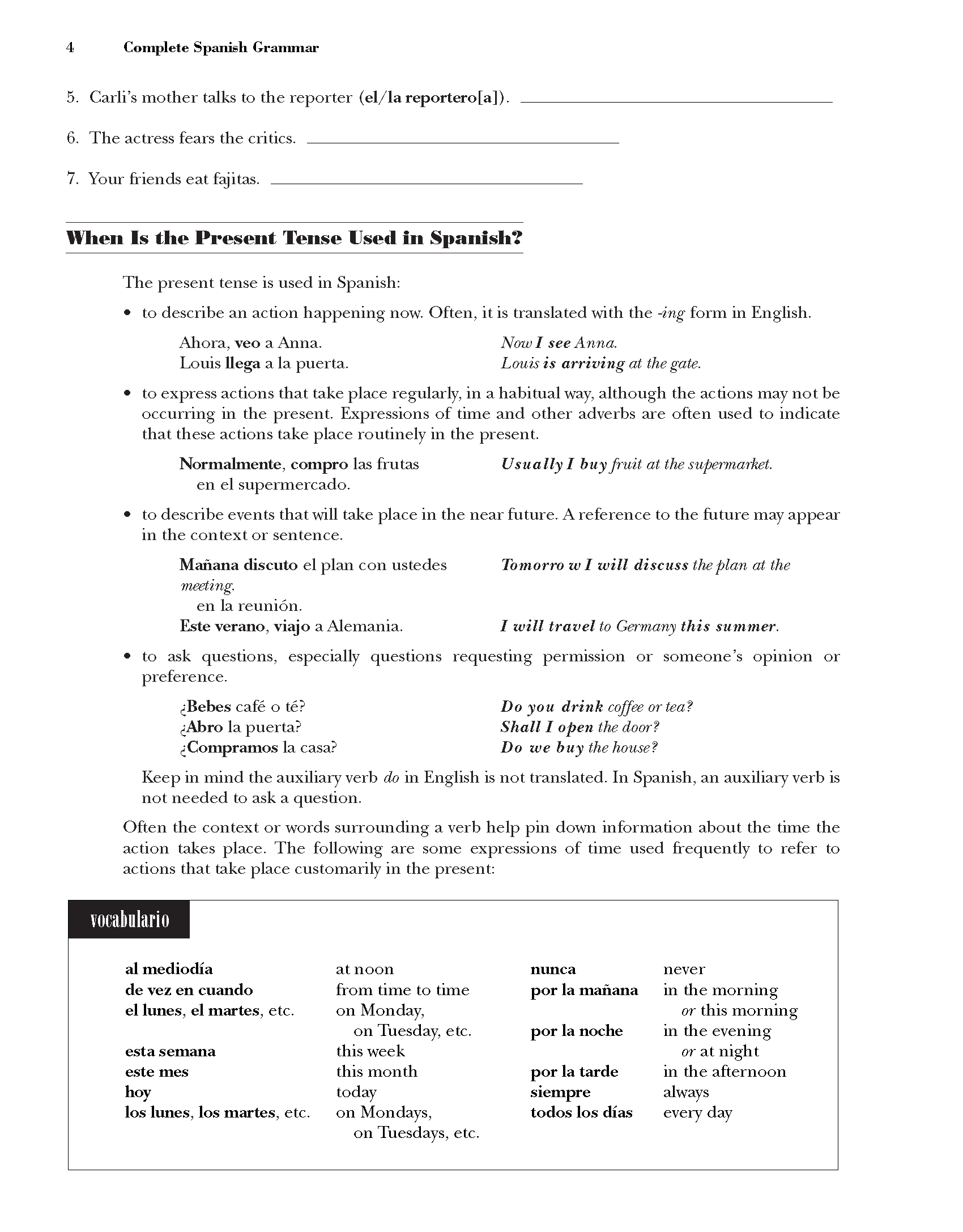CSG015

4
Complete Spanish Grammar
5. Garli’s mother talks to the reporter (el/la reportero[a]).
6. The actress fears the critics. _
7. Your friends eat fajitas. _
Wlieii Is the Present Tense Used in Spanish?
The present tense is used in Spanish:
• to describe an action happening now. Often, it is translated with the -ing form in English.
Ahora, veo a Anna. Now I see Anna.
Louis llega a la puerta. Louis is arriving at the gate.
• to express actions that take place regularly, in a habitual way, although the actions may not be occurring in the present. Expressions of time and other adverbs are often used to indicate that these actions take place routinely in the present.
Normalmente, compro las frutas Usually I buy fruit at the supermarket.
en el supermercado.
• to describe events that will take place in the near futurę. A reference to the futurę may appear in the contextor sentence.
Manana discuto el plan eon ustedes Tomorro w I will discuss the plan at the
meeting.
en la reunión.
Este verano, viajo a Alemania. I will travel to Germany this summer.
• to ask questions, especially questions requesting permission or someone's opinion or preference.
^Bebes cafe o te? Do you drink coffee ortea?
^Abro la puerta? Shall I o pen the door?
.jCompramos la casa? Do we buy thehouse?
Keep in mind the auxiliary verb do in English is not translated. In Spanish, an auxiliary verb is not needed to ask a question.
Often the context or words surrounding a verb help pin down information about the time the action takes place. The following are some expressions of time used ffequently to refer to actions that take place customarily in the present:
|
iwaliiilami | |||
|
al mediodia |
at noon |
nunca |
never |
|
de ve z en cuando |
from time to time |
por la manana |
in the morning |
|
el lunes, el martes, etc. |
on Monday, |
or this morning | |
|
on Tuesday, etc. |
por la noche |
in the evening | |
|
esta semana |
this week |
or at night | |
|
este mes |
this month |
por la tarde |
in the afternoon |
|
hoy |
today |
siempre |
always |
|
los lunes, los martes, etc. |
on Mondays, on Tuesdays, etc. |
todos los dias |
every day |
Wyszukiwarka
Podobne podstrony:
CSG081 70 Complete Spanish Grammar Gompound verbs componer to fix compondre oponer(se) to
CSG045 34 Complete Spanish Grammar estar por + a noun to be in favor of Estoy por la reducción de lo
CSG077 66 Complete Spanish Grammar • Use volverse + adjective to express an mvolun
CSG261 250 Complete Spanish Grammar • Use lo que to refer to a statement, concept, or idea that is u
CSG295 284 Complete Spanish Grammar • A preposition + a noun modifies a verb. The
CSG057 46 Complete Spanish Grammar Morę Irregular Yerbs in the Preterit • Dar, ser, and ir are irreg
CSG155 144 Complete Spanish Grammar Impersonal expressions followed by the indicative include: es ci
więcej podobnych podstron